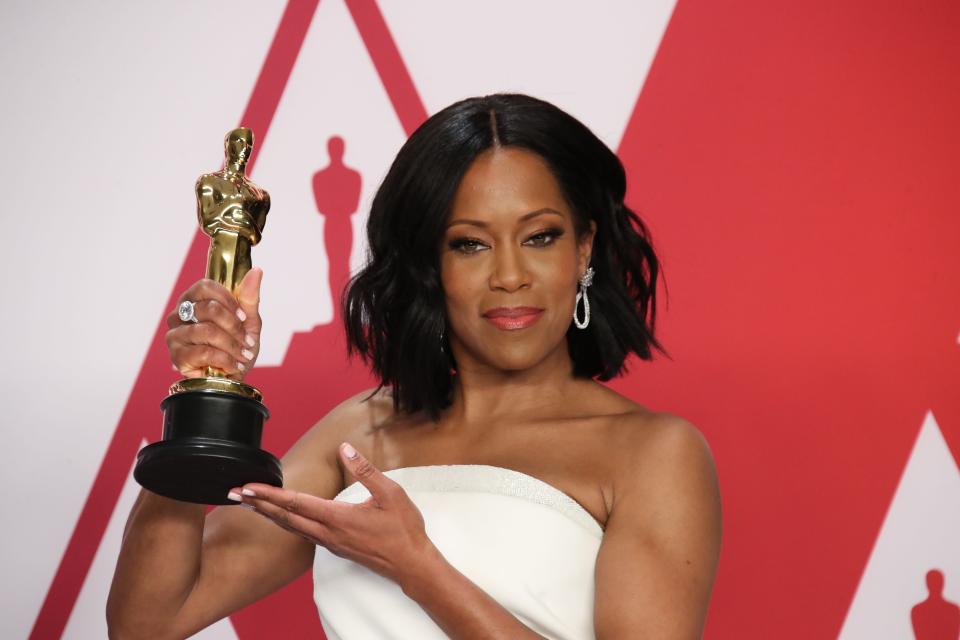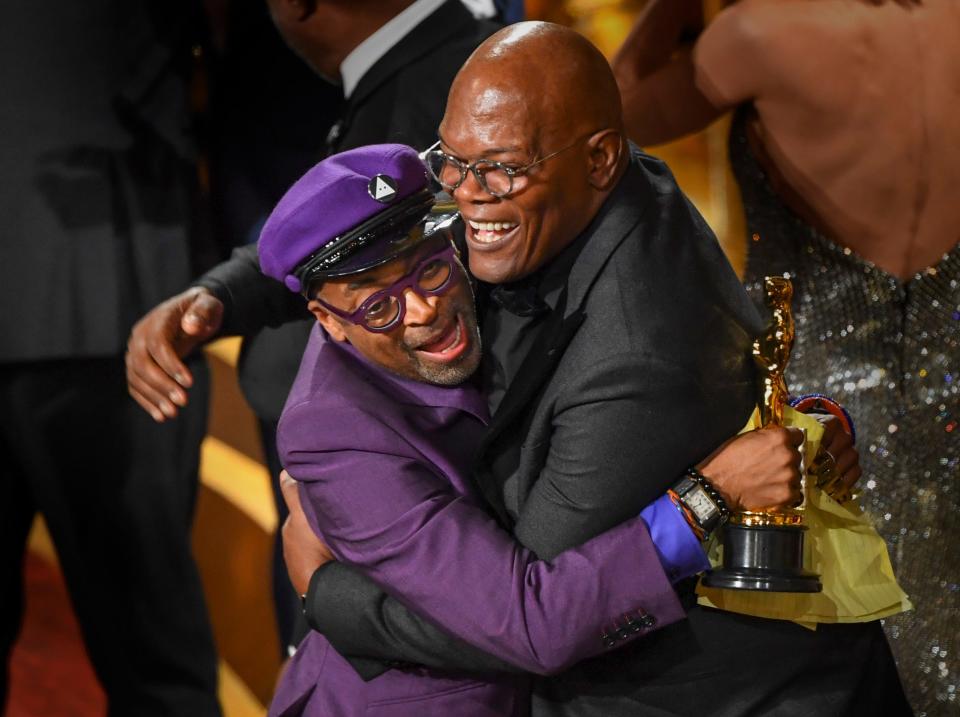Are the Oscars worth saving? An Oscars hater and an Oscars lover fight it out
The Oscars are at a crisis point.
The opulent awards ceremony, now in its 94th year, is flailing. Earlier this year, the Academy of Motion Picture Arts and Sciences controversially announced it was eliminating eight categories from the live telecast, including film editing, makeup and hairstyling, while adding an Oscars Fan Favorite category voted via Twitter in what reads as a desperate bid to get more popular films like "Spider-Man: No Way Home" into the mix (Thank you baby Jesus!)*.
The show has experimented with format as it's tried to halt a decline in viewership (Spoiler: that didn't work).
But the show keeps bleeding viewers (Oh no, our Oscars! It's broken!). Last year, when "Nomadland" took best picture, only 10.4 million viewers watched, whereas 2014's show with "12 Years a Slave" drew in a record-high 43.7 million (A coincidence? I think not!).
Was it the pandemic that plunged viewership to a record low? Were the wrong movies nominated? (Definitely.) Have streaming services changed viewing habits so much that must-see TV events are no longer so must-see?
Or is it that after 94 years, the Oscars are just ... done?
That question prompted fierce debate among the USA TODAY Life and Entertainment staff, particularly between Rasha Ali, taco connoisseur and entertainment reporter whose sole purpose in life is to be besties with Rihanna, and Barbara VanDenburgh, books editor and rabid cinephile who eats popcorn for dinner more often than she should admit. Rasha thinks the Oscars are out of touch (and also painstakingly boring), while Barbara thinks the ceremony, while flawed, is an often entertaining and sometimes life-affirming escape.
Rasha's opening argument: I used to love the Oscars. I loved watching celebs get glammed up and seeing Brad Pitt on the carpet and being like, "Hi, can you marry me?" It felt so fantastical, so surreal. As I got older, especially within the last few years, you just realize it's all BS. I would rather catch it on Twitter the next day, because watching a three- to five-hour show is legit like sitting through someone's graduation … and everybody hates graduations.
Barbara's opening argument: The Oscars is the Super Bowl of pop culture. For just this one night, I get to convene with other pop-culture junkies to talk about the art of cinema. Even when the Oscars are bad – when the host doesn't work and the jokes don't land, when the wrong movies win and glass ceilings remain unshattered – I still get my pop-culture fix. Even complaining about the Oscars is its own form of entertainment.
Rasha: Obviously I'm watching it from a Black woman's perspective, so for me, it's not our pop culture. We barely get recognition from the Oscars, and when we do it's crumbs.

Barbara: I can't argue that. As a white person, I see myself represented at the Oscars a lot more than you you do. As a woman, I can relate to the crumbs. The category I'm most excited about this year is cinematography. Ari Wegner, who lensed "The Power of the Dog," is only the second woman in the history of the Oscars to be nominated for cinematography, and no woman has ever won. That's indefensible. But I also can't pretend I won't be over-the-moon excited if Wegner wins.
Rasha: OK, truuuuuue, but isn't that sad? It's been like a million years since the Oscars started, and we're still crowning firsts. I'm not going to lie; it does feel good to see those wins – like when Daniel Kaluuya won last year, I was so proud. But then it kind of still makes me mad. Why am I so excited over a Black man winning? Not that I shouldn't be excited for him, but a Black man winning an Oscar should be so normalized by now.
Barbara: Again, you're right. And it sucks. But the Oscars still has the power to move the needle in positive ways. Take Regina King, for example. She put in decades of hard, underappreciated work and finally got her flowers for "If Beale Street Could Talk." Since then, she's won an Emmy for HBO's "Watchmen," directed her first feature film "One Night in Miami..." with more to come, and she's producing. It's the result of her hard work and talent, but I have to think her Oscar win got her some green lights.

Rasha: I LOVE REGINA KING! And I do love those little moments where Chris Evans helps her up the stairs and she's kiki-ing with Brad Pitt. But it took her working so hard to finally be recognized, and even that doesn't happen for most actors of color. For the most part, once Black actors win an Oscar, they're not everywhere. A career bump doesn't happen for most of them. So I think, why should we be making such a big deal about the Oscars? There's the Critics Choice Awards, and then Screen Actors Guild Awards and Golden Globes and the Emmys and it's just a lot. Like, are these not all the same people voting for the same things?
Barbara: Awards season is definitely too long, but the Oscars is still king. It brings together the biggest personalities to experience the biggest emotions on the biggest stage, and that can make for really good television. Sometimes when I'm sad I'll cue up Olivia Colman's acceptance speech when she won best actress in a surprise upset over Glenn Close. Or Spike Lee finally winning a best adapted screenplay Oscar for "BlacKkKlansman." He's so excited, he jumps into Samuel L. Jackson's arms, and it's electric! You know Spike Lee knows the Oscars are BS. You know he knows he should have won decades ago. And he still turned into a child when he won, he's so excited.

Rasha: That's cute. But I wish there were more relatable moments like that. It's just, there's a whole pandemic, a World War III pending. And then you see these people looking so poised and it's just so much perfection. If it was more relaxed and celebrities were able to say what they wanted to and just acted like real people, I feel like it would be more entertaining.
Barbara: Yes, seeing a bunch of rich people pat themselves on the back three years into a pandemic while the world is falling apart is wearying when I'm sitting in the corner of my tiny rented house with my laptop propped on a plastic TV tray. But the world has always been a trash fire of inequality, which is why I need the escapist glamor of pretty people in sparkly dresses. By all means, let's eat the rich. But after they've given their acceptance speeches. What would need to win this year for the Oscars to win you over?
Rasha: "King Richard." And Will Smith. OK, so this is a secret between you and me (and everyone else reading this), but I haven't seen the movie yet. But like Issa Rae, I, too, am rooting for everybody Black.
Final verdict
Barbara and Rasha have found commonalities in their love and hatred of the Oscars. While Barbara understands she's enjoying the Academy Awards from a privileged position, she believes the Oscars still has the power to spark joy and change lives when it gets things right. And she thinks that makes it worth fighting for. Rasha will never forgive the Oscars for making "Gone With the Wind" winner Hattie McDaniel sit at a table away from her co-stars but can easily be won over by receiving tickets to next year's show … just to, you know, see if Barbara's points check out.
*Comments in italics were snuck in by Rasha
This article originally appeared on USA TODAY: Oscars smackdown: Is the award show worth saving? We fight it out

